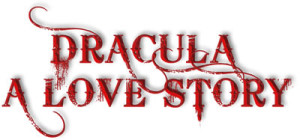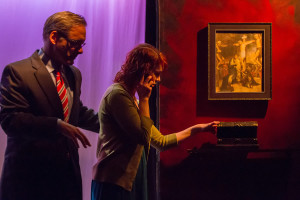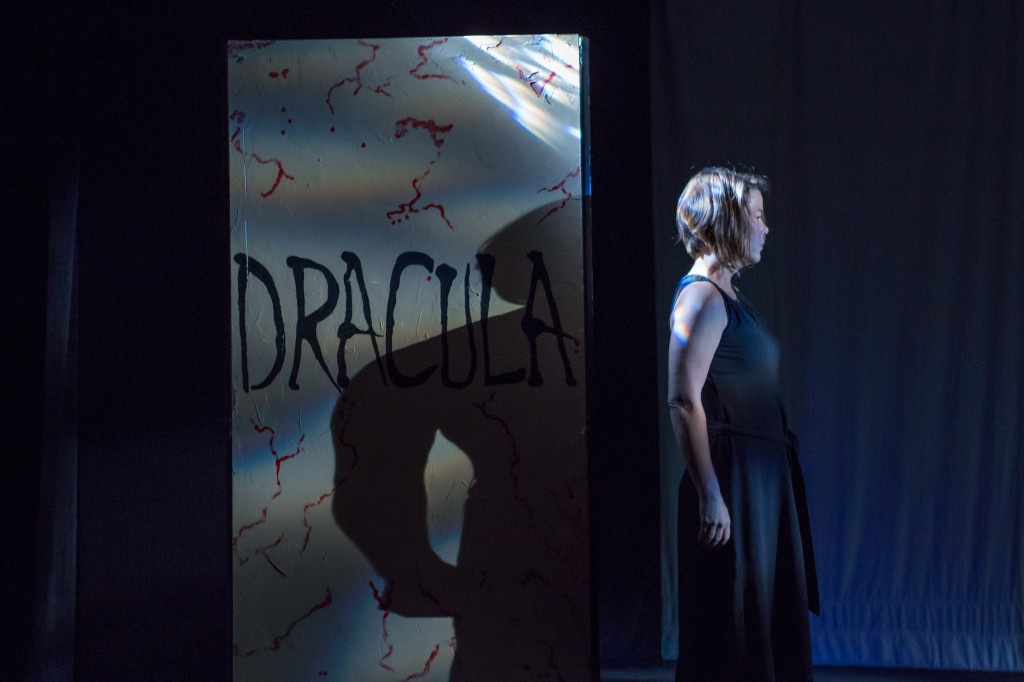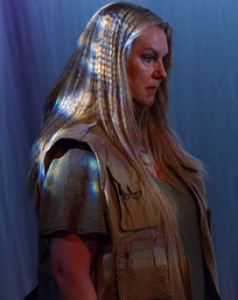He is a predator, we are prey. His abilities exceed ours; his senses are sharper; he is more intelligent; he is physically more able. Stoker has him transform into a bat or a wolf but, really, why would he bother? He’s Dracula.
I read Dracula – the famous Balderston-Deane play which was turned into the Tod Browning movie – in 2003 and resolved to write a play about everything that play ignored. I finished eleven years later and got it staged last month.
 I know, I know. What could possibly be written about the vampire-American community that hasn’t been written already – by Stoker, by Balderston and Deane, by Murnau, by Browning, by their innumerable successors? There have been romantic Draculas, gay Draculas, black Draculas, comic Draculas. There are so many vampires in Ann Rice’s universe that they could have their own zip code. We have vampires on TV, agitating for their civil rights.
I know, I know. What could possibly be written about the vampire-American community that hasn’t been written already – by Stoker, by Balderston and Deane, by Murnau, by Browning, by their innumerable successors? There have been romantic Draculas, gay Draculas, black Draculas, comic Draculas. There are so many vampires in Ann Rice’s universe that they could have their own zip code. We have vampires on TV, agitating for their civil rights.
So what is it that makes the Dracula story so resonant? Surely it isn’t that he sinks his fangs into your neck, and drinks your blood. Mosquitoes do that, so the difference is quantity, not kind.
Let’s deconstruct Dracula, and consider the creature apart from all the mystical mumbo-jumbo that surrounds him. He is, first of all, an apex predator. That gives him a certain immunity from judgment, though it may not seem that way from where you sit. The apex predator is lord of all he surveys, and if he feeds on us without conscience, it is his right to do so.
Disagree? You shouldn’t, since, unless you are a breatharian, you are an apex predator now. You toss some other creature, animal or vegetable, into your slavering jaws, without a thought to its personality. Be honest: as you chew on your calamari, do you think of the life she might have had in the deep seas? Did she have children? Did she love the feel of the cold against her tentacles there in the inky depths? We comfort ourselves with the thought that the animals we eat are not self-conscious, and are unaware of both life and death. But anyone who has seen a steer bellow in terror in the slaughterhouse, or watched a treed bear weep as hunters surrounded him, knows this is not true.

So why should it be different with Dracula? He is a predator, we are prey. His abilities exceed ours; his senses are sharper; he is more intelligent; he is physically more able. Stoker has him transform into a bat or a wolf but, really, why would he bother? He’s Dracula.
He kills us, as we kill the horned beasts, and his blame, viewed objectively, is no worse than ours. His foes – speaking for us – call him an unspeakable fiend. But that’s nonsense, as we should know. His foes note that he is intelligent, and claim that his knowledge of good and evil should prevent him from preying on us. But we’re intelligent, and prey on anything we can get our hands on – sometimes even other humans.
So, yes, Dracula kills. But that’s not where the terror lies.

What is the thing that terrifies you the most? I know, I know, we are terrified of the endless no. No matter what we believe of the afterlife, the moment of our death will be one of terror, and we can sicken ourselves thinking about it. In the best case, we will be submerged in eternal joy, but there will be no ice cream, and those we loved on this plane will be as lost to us as we are lost to ourselves. In the worst case – the worst case, I propose, is not the endless torments of Hell but nothingness, oblivion, the negation of self. I would rather rule in hell than serve in heaven, Milton’s Lucifer cries; our feeble echo is that we would rather be tormented than not be at all.
So, death, yes. It comes in a thousand forms – the stilled heart, the riot of cell growth that is cancer, the unpredictable assault of the wild animal – perhaps one with a gun. Whatever it is, it is terrible, terrible. Let’s go beyond that. What’s worse than death? Consider the fantasies with which we torture ourselves. Frankenstein’s Monster – an animated corpse, bestowed with a fierce physicality, capable of breaking a man’s spine with his bare hands. The Wolfman, combining the ravenous power of a wolf with the feral intelligence of a human. The Alien, who bursts out of your stomach in an obscene parody of a Caesarian section, and thereafter grows and transforms every hour. Zombies – more corpses, these ones virtually unkillable – who hunt you down to eat your brains.
But in the end you are dead, and it is no different than if you had suffered a coronary, or been shot in an alley by someone looking for money to buy crystal meth. There is pain and a certain lack of dignity, but it is over in a moment as you enter the far country from whose bourne no traveler returns.
There is something worse than death, though – abandonment. It is one thing to fall to an assault – to battle bravely, with your companions, as a warring force superior in numbers or equipment brings you low. That’s the Alamo; that’s the conclusion of Cyrano de Bergerac. But when your allies – your friends; those you love and those who love you – cross over to the enemy, and do so because he is your superior in every way, you become nothing. You enter oblivion, and all are oblivious to you.
And that is Dracula. One look from his steely eyes, and your friends, hitherto your allies against him, become his creatures. The woman you love steps forward and obediently offers her neck. You are abandoned because he is God, he is Satan, he is Dracula…and you are nothing. You are beneath his contempt. He gives you less notice than you give the stinkbug which has landed next to your glass of absinthe.
Now let’s look at Dracula from another point of view – that of his victim, who he seduces into vampirehood. Dracula converts. He is a missionary, a lobbyist, a virus. He makes us be like him. How does this happen? Dracula, the predator, is a little like the anglerfish, whose wormlike appendage draws in the fish he will gobble up. Dracula offers the illusion of a thing of incalculably higher value to draw in his victim, in whom he will plant the seeds of vampirehood, which will grow – quickly – into a creature like himself.

Eva Calderone, a subject-matter expert who the family has brought in to determine Lucy’s affliction, describes it exactly:
EVA
You were a good person, Lucy. But with each passing minute Lucy Cervas is going further and further away and the virus, the vampire, is overtaking her. Soon, Lucy will be altogether gone, and what’s left will be as malignant as cancer.
(Very softly) I know what he said. You will live for forever. But you won’t, Lucy. You’re dying now.
LUCY
I’m not. I drank his blood. I will live forever. He promised me, and I believe in him.
EVA
The human part of you is dying. The part that’s capable of love, and honor, and compassion. By tomorrow it will be gone. You’ll be the virus, killing and feeding as ruthlessly as an adder.
How does that feel, to the victim? To paraphrase the old song, it’s a little like being in love.
This is tricky business, so stay with me. Love is many things, but one of the things it is is a surrender of the self to the other. If you have been in a relationship of long standing you have seen it yourself: the essence of togetherness is compromise, and what was once a compromise choice eventually becomes a preference. Have you ever said this? “I would rather watch a cement mixer churn than see an opera (or go to church, or a WWF match, or “Blue”, the famous avant-garde movie where you watch a blue screen for an hour and a half), but it will please my beloved to go, and so it would please me.” Of course you have. And if, five years later, you find yourself humming an aria from La Bohème, or planning a Christian youth retreat, or wondering what it would be like to look at a red screen for an hour and a half, you have experienced the transformative power of love. It is what we all crave.
So what draws Lucy to Dracula is, first of all, that he pricks her desire for the transformative power of love. She seeks to become her beloved’s creature, as any lover might say “I’m his” or “I belong to her.” An old-fashioned word for the act of love is “possessed”, as in “she possessed him.” (I don’t think it’s gender-specific.) Lucy has a relationship at the top of the play with Jack, her fiancée; she loves him, in the sense that she admires him and enjoys being with him and they are sexually compatible. But she is not possessed by him. Far from it. She doesn’t even understand what he’s talking about most of the time.
Talking to Vlad Tepes – who is, unknown to her, Count Dracula – Lucy says:
LUCY
Right! There’s something so…normal about Jack. Sometimes we’ll be in bed and he talks so earnestly about – international trade or tax policy or something. And he sounds so sure about what he’s saying that I’ll drift right off to sleep, knowing that everything’s o.k. and I say to myself, of course, I’m in such good hands. He’s thoughtful; he’s capable.And then in the morning, I look at him, at the breakfast table, reading the paper, calling the office on his cell, and I think…
TEPES
(After several beats) Think what, Lucy?
LUCY
That…I think that I’ll never be in love. Never know what that feels like.
Dracula, who has selected Lucy for conversion, senses an opening. He articulates her dream of union, of possession, of merger with the other:
TEPES
(They are quiet for a moment.) You will fall in love—I know this—with such force and violence that you will become a different person. Closed doors inside you will open and you will find yourself willing to do anything. Where you were diffuse before your focus will become extremely narrow. You will fall in love with someone who makes you forget how to breathe. Someone who loves you as you deserve to be loved. You look at Jack and say, “he will keep the wolf out.” But when you meet the one you truly love you will say, “let him bring the wolf in.” You will say, “he is the wolf.” Your breath will become his breath; your thoughts, his thoughts. And your blood will become – phosphorescent.
Dracula takes her – they take each other – after Lucy confronts her father and rejects Jack. After the conversion, the others begin to talk about the historical Vlad Tepes’ bloody 15th-century confrontation with the Turks. Lucy takes her beloved’s side. (In our production, Dracula is there, feeding her lines, invisible to everyone but the audience).
EVA
I mean he hoisted them six feet high on pikes, hands and feet bound, blade run through the stomach and back, left there to die in the pitiless sun, and thereafter to rot, day after day after day, until the flesh fell off their bones. (All are quiet for a moment.)
LUCY
Well, good for him!
JACK
Lucy!
LUCY
They were invaders. Terrorists.
Still later, she becomes more forthright:
LUCY
(As if suddenly awakened.) Lies! Lies and jealousies! If you felt what it was to surrender, to murder light and be in darkness, and to have the darkness be a better light.
JACK
What the hell are you talking about? (There is a sudden pounding on the door.)
Is she a vampire, a demon being inserted into human consciousness? Or just a woman in love?
Well. It is one thing to acquire a taste for opera through the beloved, and another to find a taste for human blood. So let’s take a look at a force even more powerful than romantic love: religion.
It is beyond peradventure that great crimes are committed in the name of religion, and more than that: conversion to a religion liberates the aggressive soul to commit aggressive acts. As an adherent of a violent form of Islam, John Lindh could act out the violence which he suppressed during his Catholic youth (not to say that Catholics – or members of any religious group – are incapable of institutional violence). And, less dramatically, many people join religious cults as a way of offending or aggressing against members of their family, while operating under a patina of righteousness.
But I’m thinking of an even more significant conversion: the conversion of spirit-in-body to pure spirit which takes place at death. I remember a grade-school religion class in which the teacher described the experience of heaven. “We will spend eternity singing the praises of God,” she explained. It was the conventional view.
“Sounds pretty boring,” one of my classmates said. This was also the conventional view.
“But you’ll be different,” the teacher explained. “It sounds boring to you now. But when you’re in heaven, it will seem like the most wonderful thing imaginable.”
So after death, does our perspective change? Or does the “I” become a “not-I”, a creature different than the one we are on earth, with different values and sensibilities? Will we remember ourselves on earth, but only with a mix of indulgence and contempt, as some remember their hard-drinking college days? Or will these praise-singing creatures think of their earthly selves as strangers, technically connected to them but not tied in any emotional way? Will they bother to think of their earthly selves at all, or will their total consciousness be occupied by the singing of praise? Or perhaps we are all eternal creatures, having taken a brief detour to don our defective human selves, and because of those defects do not recognize who we really are?
Dracula and Lucy talk about this while looking at a painting of the crucifixion.
LUCY
I’ve never seen anything like it.
TEPES
And yet in many ways it’s quite traditional. The crown of thorns, the jeering crowds. Note how the nails are through the wrists, which is historically accurate. If they went through the hands He would have slid right off the cross.
LUCY
He’s smiling.
TEPES
He’s winking. He knows death is a hoax.
LUCY
(Shudders.) Death is no hoax, Vlad. I saw my mother….
TEPES
“If you drink My blood….you will live forever.” Do you believe that?
LUCY
Well, now it sounds kind of creepy, the way you say it.
TEPES
What do you suppose that would be like, to live forever?
LUCY
Um…boring, I suppose. If we lived forever, graduate school would take, like, fifty years.
TEPES
(Makes dismissive gesture) I don’t mean like this. This is another sort of hoax. I mean when the scales fall off our eyes, when we see things as they really are. As He saw them. (makes gesture toward the unseen painting).
LUCY
I’m not following….
TEPES
Imagine that death is not the end of things, but the beginning! We trying to figure things out with our telescopes and our electron microscopes but what if reality is not something you figure out, it’s something you surrender to? (Lucy still looks puzzled.) What if the path to enlightenment is not graduate school but communion with the enlightened? By (makes gesture to the unseen painting) drinking their blood? (Lucy smiles.) What if this is our birthright – our birthright at death?
LUCY
I can see why you’re such a good lobbyist.
Dracula . A Love Story receives its first production
I had the good fortune in this Capital Fringe production to work with theater artists who got the play, and who presented it with great knowingness. Lee Ordeman played Dracula not in the traditional way – overwhelming and charismatic – but just as I had written him: as a virus, as a lobbyist, as an anglerfish, persistently maneuvering his prey to the capture position. He was less a hunter than a fisherman; and Carolyn Kashner played the fish to perfection, if the fish was a twenty-four year old Georgetown graduate psychology student. I was astonished to discover that Kashner had the character down at the first read, and did nothing but improve from that point.
Other actors did just as well. I remember a particular scene in which Christine Hirrel plays Mina (in this version, Dracula’s 500-year-old wife, now dying) as she attempts to seduce Lucy into giving herself to Dracula. Lucy casually mentions her human fiancée, Jack, and Hirrel reacts with a sound that a cat might make if you poured scalding water on him. It invokes what happens when holy water is thrown on a vampire in traditional movies, but here it has an additional meaning: it shows Mina’s extreme frustration, and the high stakes this fishing expedition holds for the two vampires. Just brilliant.
Brian Crane (who is an archeologist, in addition to being an actor) provided the most human element in the play – important, since we need him to bring home the idea that rapturous love is a human birthright. His final speech made people cry, as it should have.
Lynn Sharp Spears was exactly who I had in mind as Eva Calderone. Because the original Dracula was written in an era where women were supposed to be victims and men were supposed to be heroes (and I was writing this in quite another era) it was important to me that the Van Helsing role be done by a woman. Lynn Sharp Spears was exactly that woman: a good, compassionate person animated by a fearless affinity for truth, just as Van Helsing was. Incidentally, Crane and Spears will appear in There is a Happiness That Morning Is, a reprise of a verse play coming to the Washington area in November, 2014.
It fell to Josh Speerstra as Redland (a taming, and updating, of Renfield) and Joe Brack as Lucy’s fiancée Jack Klaxon to shoulder the comic load – essential in a story like this, which would otherwise be heavy and fearsome. They both did so brilliantly, in entirely different ways.
And so, anyway, I wrote this play and now it’s had its first production. If you would like to see this Dracula produced in your area, email me and we’ll reach out to area producers.
Dracula. A Love Story debuted July 12, 2014 at the Capital Fringe Festival in Washington, DC.
And if you are among the nearly three hundred people who saw the Capital Fringe show, what did you think about it?
Contact me at treanorwriting@earthlink dot net.
